七年级英语下Unit 11 How was your school trip Section A (GF-3b)课件(共有PPT34张)
文档属性
| 名称 | 七年级英语下Unit 11 How was your school trip Section A (GF-3b)课件(共有PPT34张) | 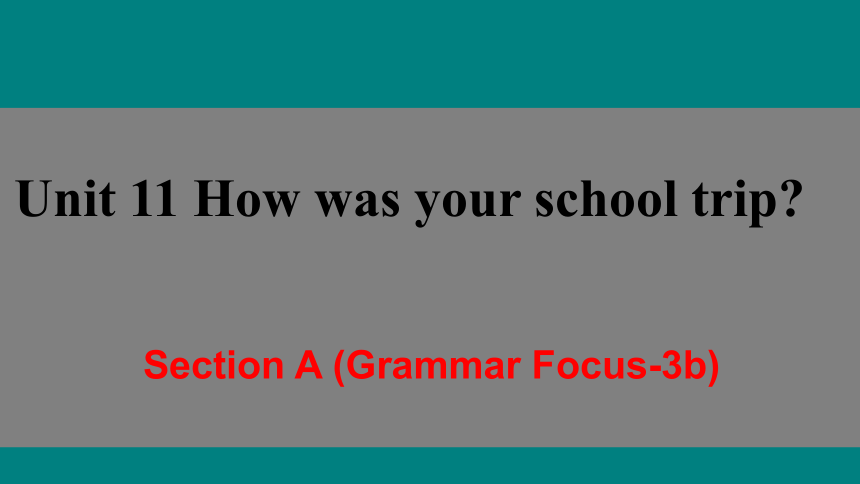 | |
| 格式 | pptx | ||
| 文件大小 | 2.3MB | ||
| 资源类型 | 教案 | ||
| 版本资源 | 人教新目标(Go for it)版 | ||
| 科目 | 英语 | ||
| 更新时间 | 2021-12-10 10:16:53 | ||
图片预览

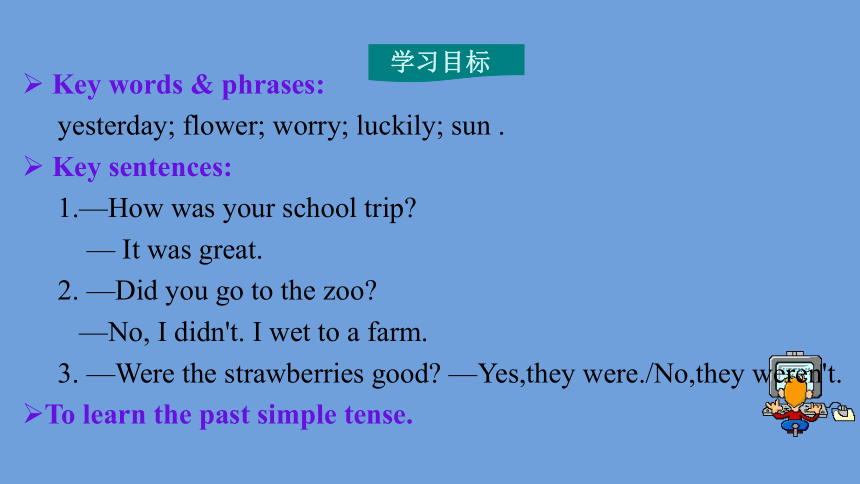
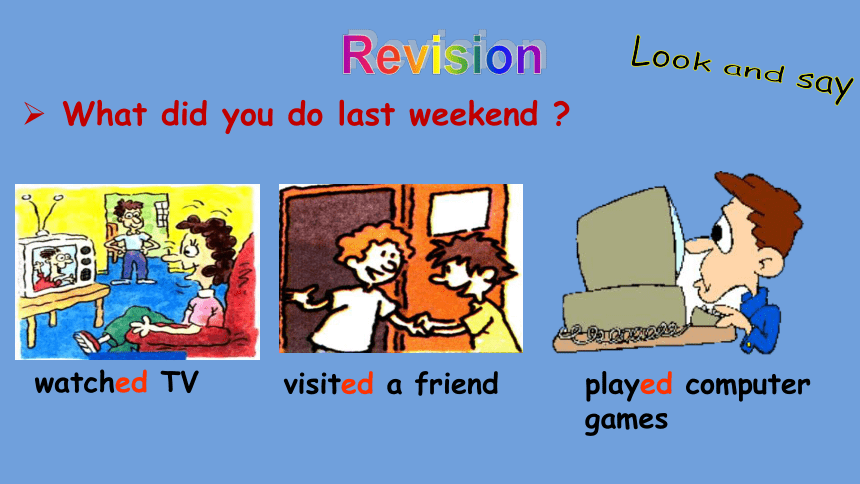
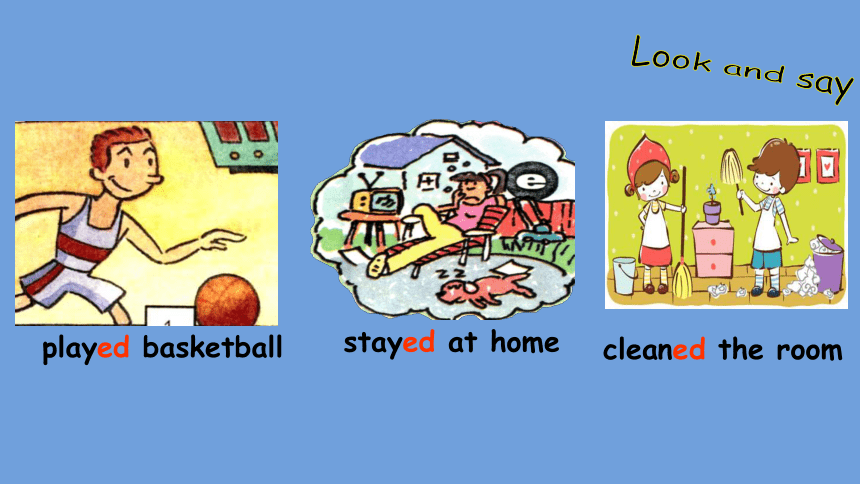
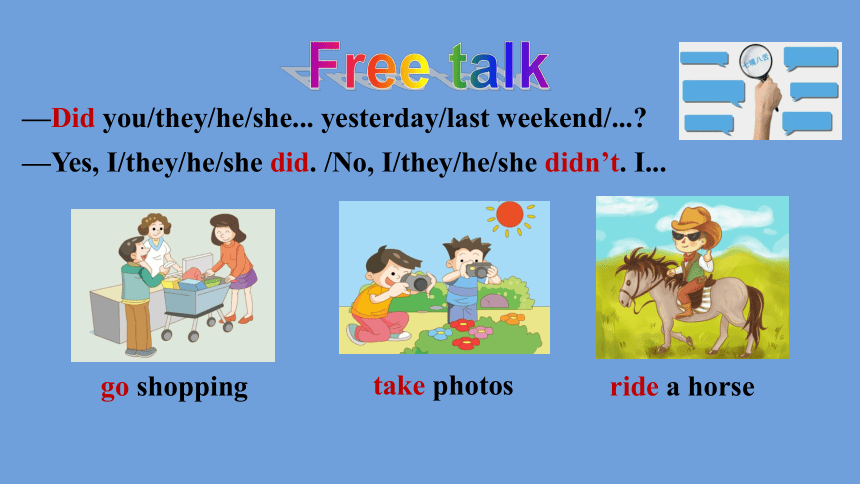
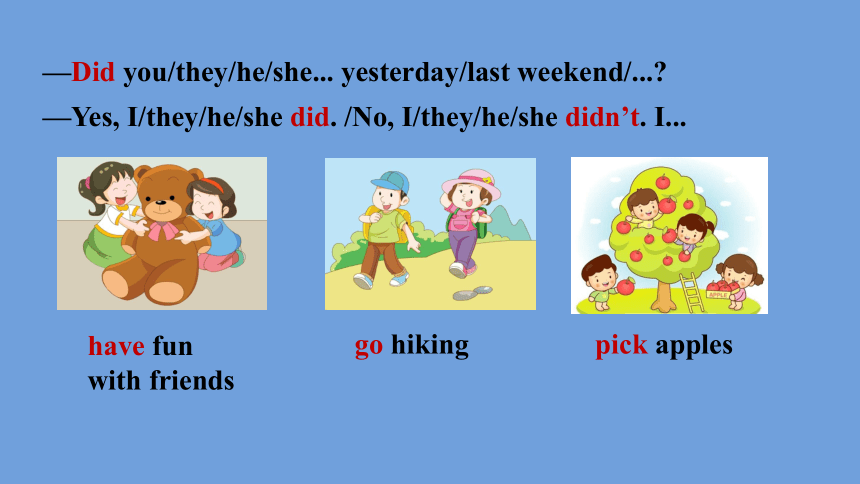
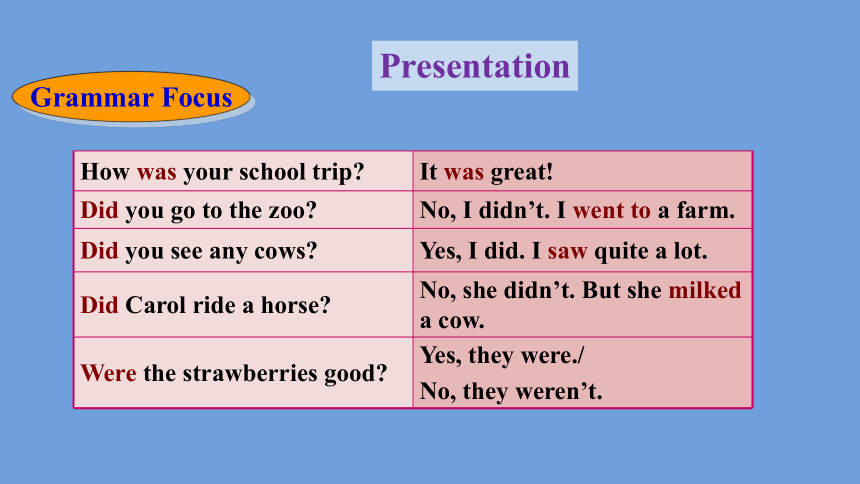
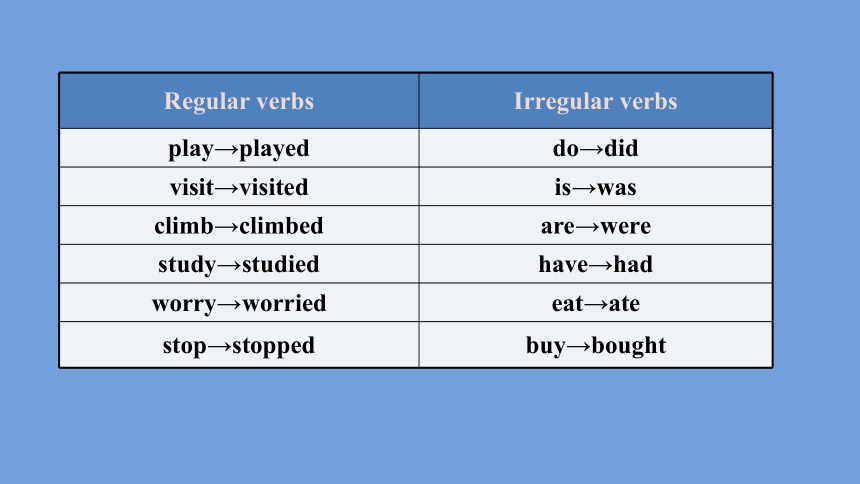
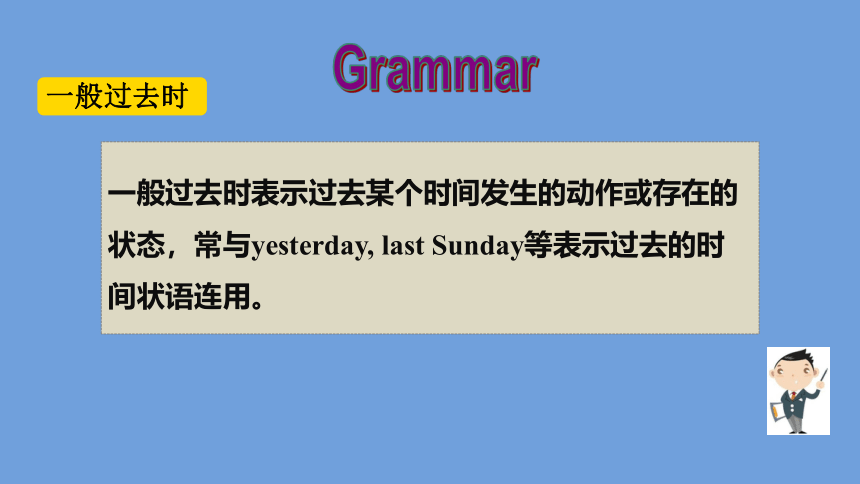
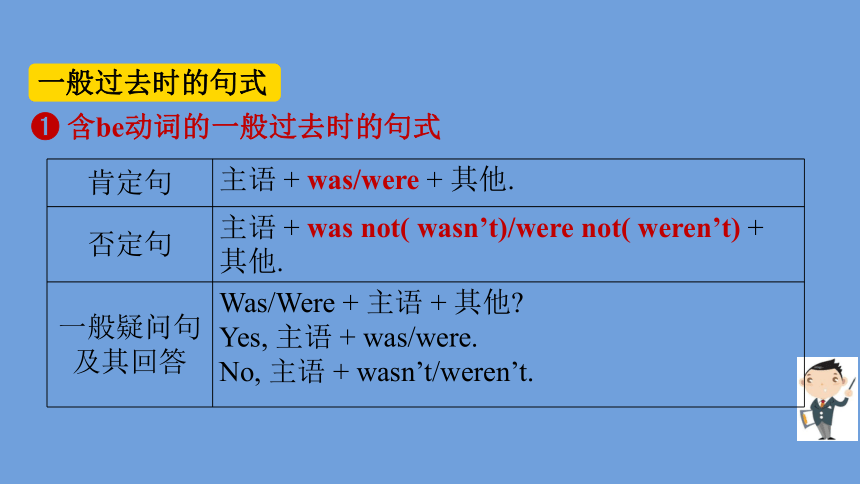
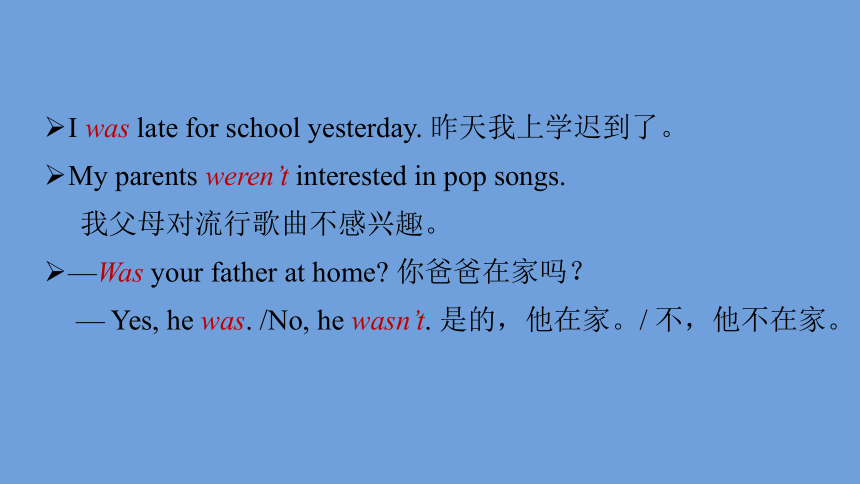
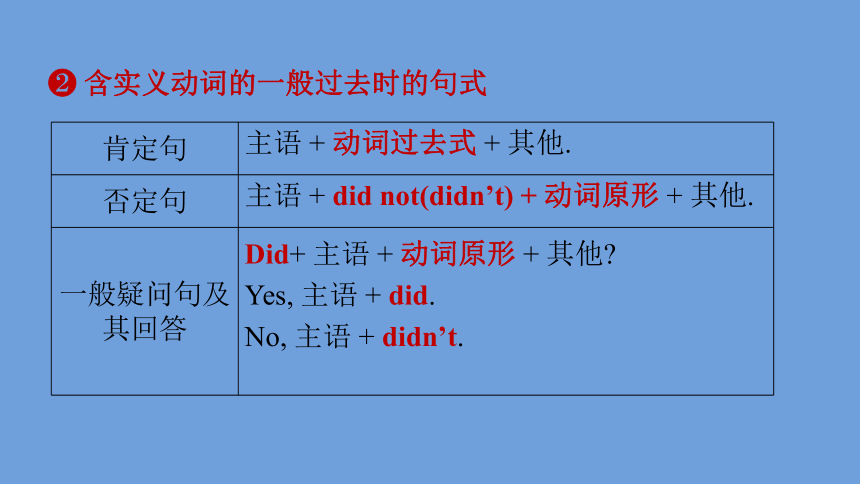
文档简介
(共34张PPT)
Section A (Grammar Focus-3b)
Unit 11 How was your school trip
学习目标
Key words & phrases:
yesterday; flower; worry; luckily; sun .
Key sentences:
1.—How was your school trip
— It was great.
2. —Did you go to the zoo
—No, I didn't. I wet to a farm.
3. —Were the strawberries good —Yes,they were./No,they weren't.
To learn the past simple tense.
Look and say
Revision
What did you do last weekend
watched TV
visited a friend
played computer games
Look and say
played basketball
stayed at home
cleaned the room
Free talk
—Did you/they/he/she... yesterday/last weekend/...
—Yes, I/they/he/she did. /No, I/they/he/she didn’t. I...
go shopping
take photos
ride a horse
have fun with friends
go hiking
pick apples
—Did you/they/he/she... yesterday/last weekend/...
—Yes, I/they/he/she did. /No, I/they/he/she didn’t. I...
Presentation
Grammar Focus
How was your school trip It was great!
Did you go to the zoo No, I didn’t. I went to a farm.
Did you see any cows Yes, I did. I saw quite a lot.
Did Carol ride a horse No, she didn’t. But she milked a cow.
Were the strawberries good Yes, they were./
No, they weren’t.
Regular verbs Irregular verbs
play→played do→did
visit→visited is→was
climb→climbed are→were
study→studied have→had
worry→worried eat→ate
stop→stopped buy→bought
Grammar
一般过去时
一般过去时表示过去某个时间发生的动作或存在的状态,常与yesterday, last Sunday等表示过去的时间状语连用。
一般过去时的句式
含be动词的一般过去时的句式
肯定句 主语 + was/were + 其他.
否定句 主语 + was not( wasn’t)/were not( weren’t) + 其他.
一般疑问句及其回答 Was/Were + 主语 + 其他
Yes, 主语 + was/were.
No, 主语 + wasn’t/weren’t.
I was late for school yesterday. 昨天我上学迟到了。
My parents weren’t interested in pop songs.
我父母对流行歌曲不感兴趣。
—Was your father at home 你爸爸在家吗?
— Yes, he was. /No, he wasn’t. 是的,他在家。/ 不,他不在家。
含实义动词的一般过去时的句式
肯定句 主语 + 动词过去式 + 其他.
否定句 主语 + did not(didn’t) + 动词原形 + 其他.
一般疑问句及其回答 Did+ 主语 + 动词原形 + 其他
Yes, 主语 + did.
No, 主语 + didn’t.
We went to the farm last weekend. 上周末我们去农场了。
Tom didn’t go to work this morning.
汤姆今天上午没去上班。
Did you ride a horse 你骑过马吗?
Yes, I did. /No, I didn’t. 是的,我骑过。/不,我没骑过。
【特别提醒】若陈述句的主语是第一人称,变疑问句时应改为第二人称,句末改为问号。
I played football with my friends yesterday afternoon. 昨天下午我和我的朋友们踢足球了。
Did you play football with your friends yesterday afternoon 昨天下午你和你的朋友们踢足球了吗?
动词过去式的构成
类别 构成方法 例词
一般情况 加-ed want → wanted
clean → cleaned
以e结尾的动词 加-d live → lived
like → liked
以“辅音字母 + y” 结尾的动词 变y为i, 再加-ed study → studied
carry → carried
以重读闭音节结尾,且末尾只有一个辅音字母的动词 双写末尾的辅音字 母,再加-ed stop → stopped
plan → planned
规则动词过去式的构成
【特别提醒】
(1) 在清辅音后,-ed 读/t/。如walked /w kt/, stopped /st pt/。
(2) 在元音或浊辅音后,-ed读/d/。如lived /livd/,enjoyed / n d d/。
(3) 在/t/和/d/后,-ed读/id/。 如studied /st did/.
类别 例词
过去式和原形一样
let → let cut → cut put → put
中间元音变化 i—a begin → began sing → sang swim → swam
ring → rang sit → sat give → gave
drink → drank
i—o drive → drove ride → rode write → wrote
o/a—e grow → grew know → knew
throw → threw draw → drew
不规则动词过去式的构成
类别 例词
过去式以ought和aught结尾 buy → bought think → thought
bring → brought catch →caught
teach → taught
结尾的d变为t build →built lend →lent
send →sent spend →spent
含有双写字母的词,将双写改为单写,在词尾加t keep → kept sleep → slept
sweep → swept feel → felt
3a
Complete Jim’s letter on the left and Bill’s reply on the right.
Dear Bill,
How _____ (is) your school trip yesterday ____ (Do) you_____ (go) to the zoo _____ (Do) you take any photos _____ (Do) you _____ (see) any interesting animals I ____(go) to the zoo last year and it
_____ (is) a lot of fun.
Jim
was
Did
go
Did
Did
see
went
was
/ jest (r)de /adv. 昨天
Dear Jim,
My school trip _____ (is) great! We _____ (have) so much fun! We _____ (go) to Green Park. We _______ (climb) the mountains there and _____ (see) a lot of flowers. We _____ (eat) our lunch under some trees and ______ (play) some games after that. But at about two o’clock, it _____ (get) very cloudy and we _______ (worry) it would rain.
Luckily, it ______ (do not), and the sun _____ (come) out again!
Bill
was
had
went
climbed
saw
ate
played
got
worried
didn’t
came
flower / fla (r)/n. 花
/ w ri/v.&n.担心;担忧 worried是过去式
/ l k li/adv. 幸运地;好运地
/s n/n.太阳
(1) Who wrote the first letter
(2) Why did he write the letter
(3) Who wrote the second letter
(4) What did he write about
It was a letter from Jim./Jim did.
He wanted to know about Bill’s school trip.
It was a letter from Bill. /Bill did.
He wrote about his school trip to Green Park.
Read the letters carefully and answer the questions.
3b
Make up a story. Each student adds a sentence.
Group work
A funny school trip
Weather sunny and nice
Where the aquarium(水族馆)
Who my teacher and classmates
Activities see some seals and sharks
hang out with my classmates
take photos
buy souvenirs
meet Yao Ming and get his autograph
take the bus back to school
Feeling tired but happy
Language points
1. But at about two o’clock, it got very cloudy and we worried it would rain.但是,在大约两点钟, 天变得阴云密布,我们担心会下雨。
【句式剖析】
But at about two o’clock,
时间状语 省略了that的宾语从句
it got very cloudy and we worried it would rain.
and连接两个并列分句
worry v.&n. 担心;担忧
【用法详解】
(1) worry在句中作动词,后面可接宾语从句。
Her parents worry (that) she may be late for school. 她的父母担心她可能上学迟到。
(2) worry还可作名词,意为“担心;担忧”。
no worries意为“没什么,不客气,没关系”,常用以回答别人的道谢。
(3) worry还可作不及物动词,意为“担心;忧虑” ,常与about连用。worry about意为“担心(某人或某事)”,相当于be worried about。
Don’t worry about me. I’m old enough. 别担心我,我足够大了。
(4) worried是形容词,意为“担忧的;担心的”。
She felt worried because her son wasn’t at home. 她因为儿子不在家而担心。
luckily adv. 幸运地;好运地
【用法详解】luckily作副词,常位于句首修饰整个句子。luckily的形容词为lucky“幸运的”。
I heard that your grandma lost her way in Dameisha yesterday.
我听说你奶奶昨天在大梅沙迷路了。
Yes. Luckily, a kind stranger managed to lead her back home.
是的。幸运的是,一个好心的陌生人设法带她回家了。
2. Luckily, it didn’t and the sun came out again! 幸运地是,没有下雨,并且太阳又出来了。
【拓展延伸】
luck n.
运气
lucky adj.
幸运的
luckily adv.
幸运地
unluckily adv.
不幸地
unlucky adj.
不幸的
反义词
反义词
Exercises
一、用所给动词的适当形式填空。
1.They _______ (take) lots of photos in the zoo yesterday.
2.She _______ (do) her homework yesterday evening.
3.I _______ (go) to the movies with my parents last night.
4.Mike _______ (have) a great time at the party yesterday.
5._______ you _______ (pick) flowers last weekend
took
did
went
had
Did pick
1.He did his homework as soon as he got home. (改为一般疑问句)
______ he ______ his homework as soon as he got home
2.The weather was bad. (改为否定句)
The weather ______ ______ bad.
3.Jenny goes to the zoo every weekend. (用last weekend改写)
Jenny ______ ______ the zoo last weekend.
二、按要求改写句子,每空一词。
Did
do
was not
went
to
三、单项选择。
1. I went to Beijing to visit my grandparents last week, and
they showed me ____ the city.
A. around B. to C. in D. /
2. He is short of money this week, so he didn’t buy _____.
A. nothing B. anything
C. something D. everything
A
B
3. —How ____ your weekend
— It ____ great.
A. was; is B. was; was C. is; is D. is; was
B
4. The teacher is already standing here. Do you know
when she ________
A. comes B. came C.is coming D. was coming
B
Homework
Preview the new words and phrases in Section B(1a-1e).
Do the exercises in students’ book.
Thank you!
Section A (Grammar Focus-3b)
Unit 11 How was your school trip
学习目标
Key words & phrases:
yesterday; flower; worry; luckily; sun .
Key sentences:
1.—How was your school trip
— It was great.
2. —Did you go to the zoo
—No, I didn't. I wet to a farm.
3. —Were the strawberries good —Yes,they were./No,they weren't.
To learn the past simple tense.
Look and say
Revision
What did you do last weekend
watched TV
visited a friend
played computer games
Look and say
played basketball
stayed at home
cleaned the room
Free talk
—Did you/they/he/she... yesterday/last weekend/...
—Yes, I/they/he/she did. /No, I/they/he/she didn’t. I...
go shopping
take photos
ride a horse
have fun with friends
go hiking
pick apples
—Did you/they/he/she... yesterday/last weekend/...
—Yes, I/they/he/she did. /No, I/they/he/she didn’t. I...
Presentation
Grammar Focus
How was your school trip It was great!
Did you go to the zoo No, I didn’t. I went to a farm.
Did you see any cows Yes, I did. I saw quite a lot.
Did Carol ride a horse No, she didn’t. But she milked a cow.
Were the strawberries good Yes, they were./
No, they weren’t.
Regular verbs Irregular verbs
play→played do→did
visit→visited is→was
climb→climbed are→were
study→studied have→had
worry→worried eat→ate
stop→stopped buy→bought
Grammar
一般过去时
一般过去时表示过去某个时间发生的动作或存在的状态,常与yesterday, last Sunday等表示过去的时间状语连用。
一般过去时的句式
含be动词的一般过去时的句式
肯定句 主语 + was/were + 其他.
否定句 主语 + was not( wasn’t)/were not( weren’t) + 其他.
一般疑问句及其回答 Was/Were + 主语 + 其他
Yes, 主语 + was/were.
No, 主语 + wasn’t/weren’t.
I was late for school yesterday. 昨天我上学迟到了。
My parents weren’t interested in pop songs.
我父母对流行歌曲不感兴趣。
—Was your father at home 你爸爸在家吗?
— Yes, he was. /No, he wasn’t. 是的,他在家。/ 不,他不在家。
含实义动词的一般过去时的句式
肯定句 主语 + 动词过去式 + 其他.
否定句 主语 + did not(didn’t) + 动词原形 + 其他.
一般疑问句及其回答 Did+ 主语 + 动词原形 + 其他
Yes, 主语 + did.
No, 主语 + didn’t.
We went to the farm last weekend. 上周末我们去农场了。
Tom didn’t go to work this morning.
汤姆今天上午没去上班。
Did you ride a horse 你骑过马吗?
Yes, I did. /No, I didn’t. 是的,我骑过。/不,我没骑过。
【特别提醒】若陈述句的主语是第一人称,变疑问句时应改为第二人称,句末改为问号。
I played football with my friends yesterday afternoon. 昨天下午我和我的朋友们踢足球了。
Did you play football with your friends yesterday afternoon 昨天下午你和你的朋友们踢足球了吗?
动词过去式的构成
类别 构成方法 例词
一般情况 加-ed want → wanted
clean → cleaned
以e结尾的动词 加-d live → lived
like → liked
以“辅音字母 + y” 结尾的动词 变y为i, 再加-ed study → studied
carry → carried
以重读闭音节结尾,且末尾只有一个辅音字母的动词 双写末尾的辅音字 母,再加-ed stop → stopped
plan → planned
规则动词过去式的构成
【特别提醒】
(1) 在清辅音后,-ed 读/t/。如walked /w kt/, stopped /st pt/。
(2) 在元音或浊辅音后,-ed读/d/。如lived /livd/,enjoyed / n d d/。
(3) 在/t/和/d/后,-ed读/id/。 如studied /st did/.
类别 例词
过去式和原形一样
let → let cut → cut put → put
中间元音变化 i—a begin → began sing → sang swim → swam
ring → rang sit → sat give → gave
drink → drank
i—o drive → drove ride → rode write → wrote
o/a—e grow → grew know → knew
throw → threw draw → drew
不规则动词过去式的构成
类别 例词
过去式以ought和aught结尾 buy → bought think → thought
bring → brought catch →caught
teach → taught
结尾的d变为t build →built lend →lent
send →sent spend →spent
含有双写字母的词,将双写改为单写,在词尾加t keep → kept sleep → slept
sweep → swept feel → felt
3a
Complete Jim’s letter on the left and Bill’s reply on the right.
Dear Bill,
How _____ (is) your school trip yesterday ____ (Do) you_____ (go) to the zoo _____ (Do) you take any photos _____ (Do) you _____ (see) any interesting animals I ____(go) to the zoo last year and it
_____ (is) a lot of fun.
Jim
was
Did
go
Did
Did
see
went
was
/ jest (r)de /adv. 昨天
Dear Jim,
My school trip _____ (is) great! We _____ (have) so much fun! We _____ (go) to Green Park. We _______ (climb) the mountains there and _____ (see) a lot of flowers. We _____ (eat) our lunch under some trees and ______ (play) some games after that. But at about two o’clock, it _____ (get) very cloudy and we _______ (worry) it would rain.
Luckily, it ______ (do not), and the sun _____ (come) out again!
Bill
was
had
went
climbed
saw
ate
played
got
worried
didn’t
came
flower / fla (r)/n. 花
/ w ri/v.&n.担心;担忧 worried是过去式
/ l k li/adv. 幸运地;好运地
/s n/n.太阳
(1) Who wrote the first letter
(2) Why did he write the letter
(3) Who wrote the second letter
(4) What did he write about
It was a letter from Jim./Jim did.
He wanted to know about Bill’s school trip.
It was a letter from Bill. /Bill did.
He wrote about his school trip to Green Park.
Read the letters carefully and answer the questions.
3b
Make up a story. Each student adds a sentence.
Group work
A funny school trip
Weather sunny and nice
Where the aquarium(水族馆)
Who my teacher and classmates
Activities see some seals and sharks
hang out with my classmates
take photos
buy souvenirs
meet Yao Ming and get his autograph
take the bus back to school
Feeling tired but happy
Language points
1. But at about two o’clock, it got very cloudy and we worried it would rain.但是,在大约两点钟, 天变得阴云密布,我们担心会下雨。
【句式剖析】
But at about two o’clock,
时间状语 省略了that的宾语从句
it got very cloudy and we worried it would rain.
and连接两个并列分句
worry v.&n. 担心;担忧
【用法详解】
(1) worry在句中作动词,后面可接宾语从句。
Her parents worry (that) she may be late for school. 她的父母担心她可能上学迟到。
(2) worry还可作名词,意为“担心;担忧”。
no worries意为“没什么,不客气,没关系”,常用以回答别人的道谢。
(3) worry还可作不及物动词,意为“担心;忧虑” ,常与about连用。worry about意为“担心(某人或某事)”,相当于be worried about。
Don’t worry about me. I’m old enough. 别担心我,我足够大了。
(4) worried是形容词,意为“担忧的;担心的”。
She felt worried because her son wasn’t at home. 她因为儿子不在家而担心。
luckily adv. 幸运地;好运地
【用法详解】luckily作副词,常位于句首修饰整个句子。luckily的形容词为lucky“幸运的”。
I heard that your grandma lost her way in Dameisha yesterday.
我听说你奶奶昨天在大梅沙迷路了。
Yes. Luckily, a kind stranger managed to lead her back home.
是的。幸运的是,一个好心的陌生人设法带她回家了。
2. Luckily, it didn’t and the sun came out again! 幸运地是,没有下雨,并且太阳又出来了。
【拓展延伸】
luck n.
运气
lucky adj.
幸运的
luckily adv.
幸运地
unluckily adv.
不幸地
unlucky adj.
不幸的
反义词
反义词
Exercises
一、用所给动词的适当形式填空。
1.They _______ (take) lots of photos in the zoo yesterday.
2.She _______ (do) her homework yesterday evening.
3.I _______ (go) to the movies with my parents last night.
4.Mike _______ (have) a great time at the party yesterday.
5._______ you _______ (pick) flowers last weekend
took
did
went
had
Did pick
1.He did his homework as soon as he got home. (改为一般疑问句)
______ he ______ his homework as soon as he got home
2.The weather was bad. (改为否定句)
The weather ______ ______ bad.
3.Jenny goes to the zoo every weekend. (用last weekend改写)
Jenny ______ ______ the zoo last weekend.
二、按要求改写句子,每空一词。
Did
do
was not
went
to
三、单项选择。
1. I went to Beijing to visit my grandparents last week, and
they showed me ____ the city.
A. around B. to C. in D. /
2. He is short of money this week, so he didn’t buy _____.
A. nothing B. anything
C. something D. everything
A
B
3. —How ____ your weekend
— It ____ great.
A. was; is B. was; was C. is; is D. is; was
B
4. The teacher is already standing here. Do you know
when she ________
A. comes B. came C.is coming D. was coming
B
Homework
Preview the new words and phrases in Section B(1a-1e).
Do the exercises in students’ book.
Thank you!
同课章节目录
- Unit 1 Can you play the guitar?
- Section A
- Section B
- Unit 2 What time do you go to school?
- Section A
- Section B
- Unit 3 How do you get to school?
- Section A
- Section B
- Unit 4 Don't eat in class.
- Section A
- Section B
- Unit 5 Why do you like pandas?
- Section A
- Section B
- Unit 6 I'm watching TV.
- Section A
- Section B
- Review of Units 1-6
- Unit 7 It's raining!
- Section A
- Section B
- Unit 8 Is there a post office near here?
- Section A
- Section B
- Unit 9 What does he look like?
- Section A
- Section B
- Unit 10 I'd like some noodles.
- Section A
- Section B
- Unit 11 How was your school trip?
- Section A
- Section B
- Unit 12 What did you do last weekend?
- Section A
- Section B
